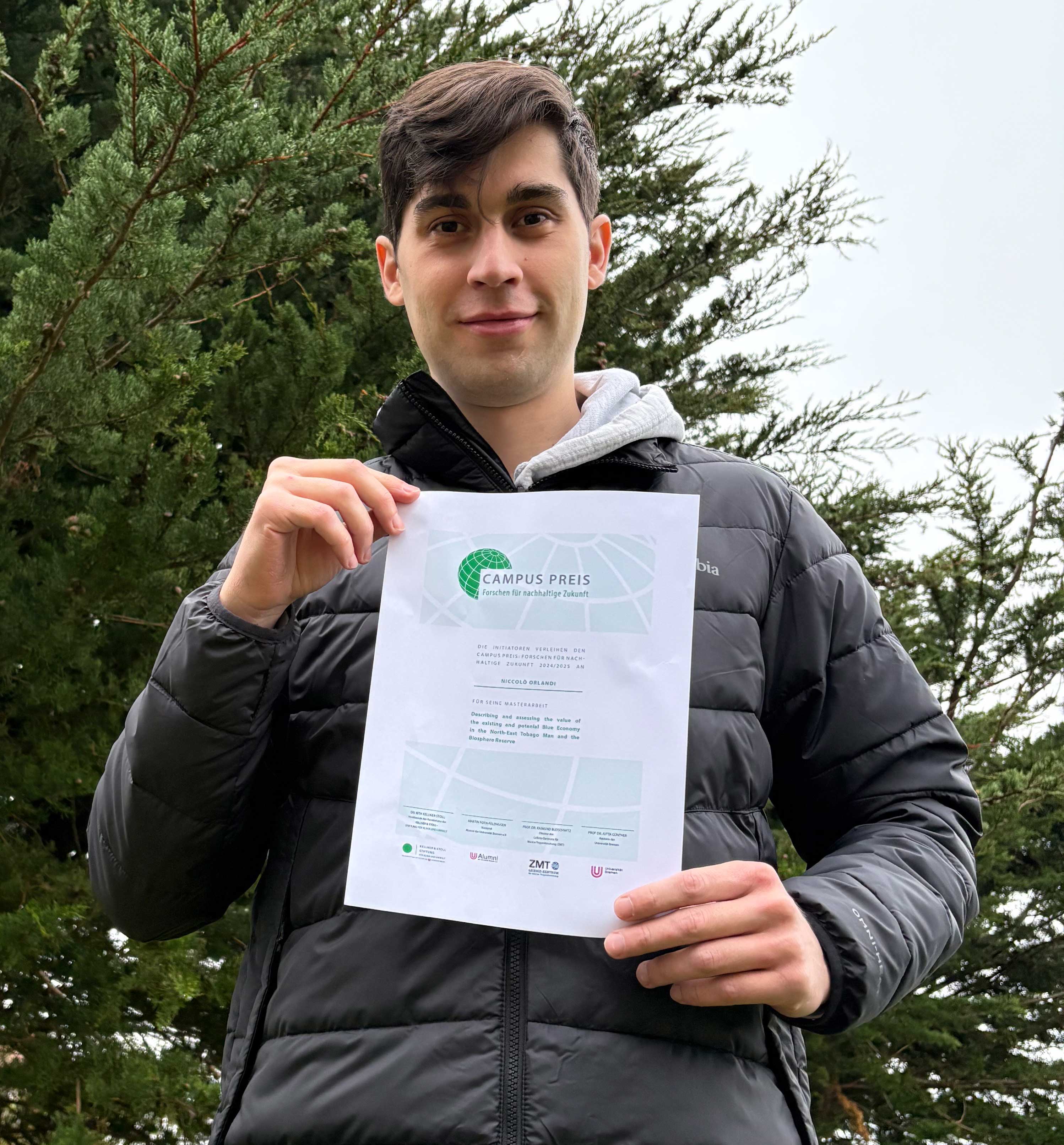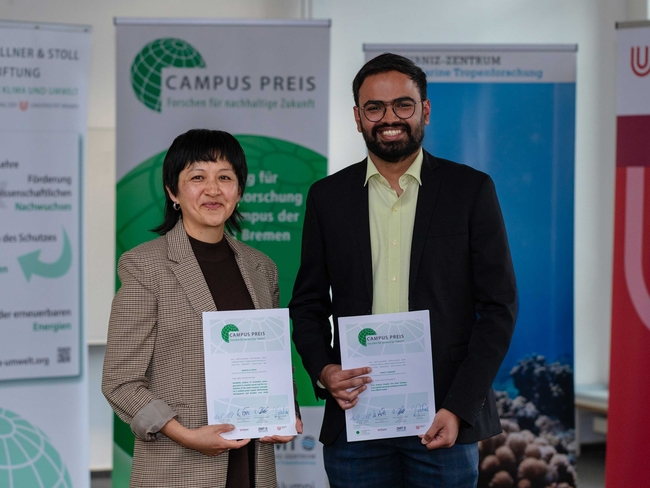08/05/2025 | This year's “CAMPUS AWARD: Research for a Sustainable Future” is honoring one dissertation and two master's theses. Mariela Tapia, Rohit Samant, and Niccolò Orlandi provide encouraging impulses for solving urgent ecological challenges and were presented with the award on May 7.
Renewable Energies Can Stabilize Ecuador's Power Supply
With her doctorate at the University of Bremen, Ecuadorian scientist Mariela Tapia is making an important contribution to the energy transition in her home country. She has investigated how an environmentally friendly and stable power supply can be achieved if renewable energies are used strategically. Ecuador's electricity supply is based on hydropower and fossil fuels. However, climate change is leading to unpredictable fluctuations in the availability of water. One solution could be the targeted expansion of wind and solar energy.
Mariela Tapia's research in the Resilient Energy Systems working group within the Faculty of Production Engineering is the first to provide detailed meteorological data sets with high temporal and spatial resolution for the entire country. This data includes solar radiation values over a period of 21 years as well as wind speed and wind direction data over a span of 14 years. A key finding of her study is that wind and solar energy can complement each other optimally and balance out the seasonal fluctuations of hydropower. The methods and data developed by Mariela Tapia are designed to help planners and decision-makers develop a sustainable energy system for the whole of Ecuador.
The Caspian Sea in Danger: Dramatic Consequences of Climate Change
Climate change is having a serious impact on many ecosystems – one of which is the Caspian Sea with its five littoral states of Russia, Azerbaijan, Turkmenistan, Kazakhstan, and Iran. In his Marine Geosciences master's thesis, Rohit Samant shows that the water level of the world's largest inland body of water could fall drastically in the coming decades.
The Caspian Sea is unique in that it has no outflow into the sea and its water level is determined solely by precipitation and evaporation. But it is precisely this delicate balance that is being disrupted by global warming. Rohit Samant developed various scenarios with the help of 15 climate models.
The results are alarming: The water level of the Caspian Sea could fall by up to 14 meters by the end of the century. Even in the best-case scenario, this would mean a drop of around eight meters, which would have devastating consequences. A quarter of the entire water surface could dry up – with serious consequences: More than 130 fish species and over 100 bird species depend on the Caspian Sea. Fishing, shipping, and tourism are vital for millions of people in the neighboring countries. Rohit Samant's work has attracted international attention. The United Nations Environment Program (UNEP) used his findings for a working paper at last year's Climate Change Conference in Baku (COP29).

Campus Award winner Niccolò Orlandi (Category Master Thesis | Photo: private
A Sustainable Future for Tobago: How the “Blue Economy” Can Strengthen the Island
How can marine resources on Tobago be used sustainably? Niccolò Orlandi focused on this question in his master's thesis at the University of Bremen and the Leibniz Centre for Tropical Marine Research (ZMT). He analyzed the possibilities of how a “blue economy,” i.e. economic activities related to the sea, can be supported on the island.
Tobago, part of the Caribbean country of Trinidad and Tobago, is characterized by untapped natural resources. Tourism, fishing, and shipbuilding are still underdeveloped. In 2020, the northeast of the island was declared a biosphere reserve by UNESCO as part of the Man and the Biosphere Program (MAB). Niccolò Orlandi has investigated whether and how this prestigious distinction is being used to support sustainable economic development.
Working closely with local people, he drew up an assessment of the region's economic potential for the first time. This has shown that there is a lack of concepts for the targeted management of tourism and the protection of natural resources, for example. There is also a need for action in the fishing industry: Stocks are declining sharply, meaning that alternative sources of income are urgently needed for fishers. Niccolò Orlandi sees one possibility in the promotion of traditional, sustainable fishing methods. Further potential is offered by environmentally friendly aquaculture, the use of marine resources for biotechnology and pharmaceuticals, and the expansion of renewable energies. In his work, he has not lost sight of his goal of keeping the island as unspoiled as possible and opening up economic options for the people in the future. Niccolò Orlandi's study now forms the basis for further activities on the island.
The CAMPUS AWARD
The CAMPUS AWARD honors outstanding theses produced on the campus of the University of Bremen that are thematically dedicated to the sustainable use of resources and the protection of the environment, the climate, and the oceans. The award was established in 2016 and is presented annually by the KELLNER & STOLL FOUNDATION FOR CLIMATE AND ENVIRONMENT, the Leibniz Centre for Tropical Marine Research (ZMT), the University of Bremen, and the University of Bremen Alumni Network. It is endowed with a total of 3,000 euros.
Further Information:
www.campuspreis.de (only available in German)
https://www.leibniz-zmt.de/en/
www.uni-bremen.de/en/alumni
www.stiftung-klima-umwelt.org (only available in German)





